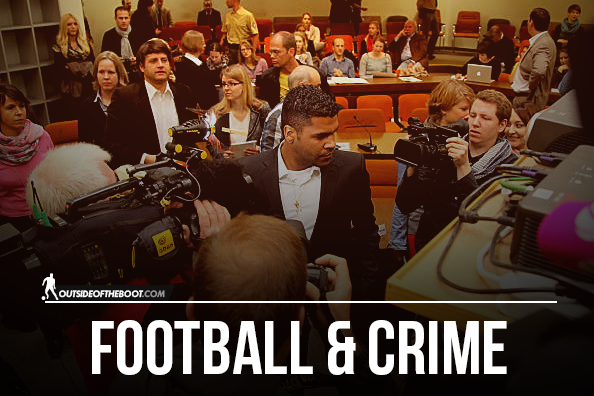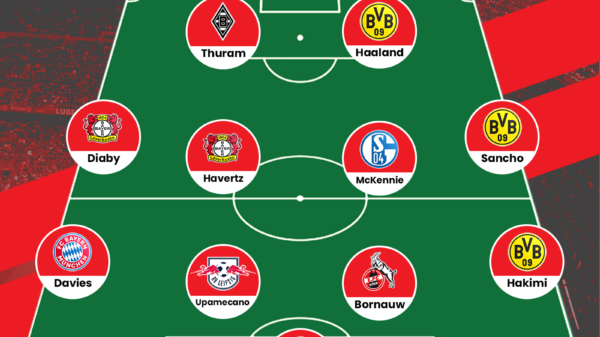Oliver McManus has a look at the incredible stories of Breno and Bruno, tracing the chain of events leading up to the drama and the aftermath
Breno and Bruno – no, not the name of an iconic duo in a Brazilian detective drama (although that is a brilliant idea – any TV producers out there, take note!), but there is a distinct police overtone to these two players.

Breno Vinicius Rodrigues Borges and Bruno Fernandes das Dores de Souza, to give them their full names, are two Brazilian footballers who share something unique and, yet, public reaction to the two of them has been quite different. The thing they share is that they have both spent lengthy spells in jail.
I should probably make one thing clear from the beginning, I am not making judgement on either player or whether they were, truly, guilty or not. I am only highlighting two examples at the extreme end of each spectrum to see if we can draw any parallels from the situation. We’ll start with Breno and take a look at his circumstances before moving onto Bruno.
An incredibly bright prospect, Breno was born in 1989 and started his professional career with Sao Paulo; the 18-year-old had played just one season when German giants, Bayern Munich came looking for his signature.
I say “just” one season, it was a somewhat remarkable season to be fair, he made 30 appearances as he helped Sao Paulo capture the Brazilian title and, individually, he won the Bola de Prata for being the best Centre-back in the league.
Understandable then, that he was touted by the best clubs around Europe; Milan, Juventus and Fiorentina were just a few to express interest in the Brazilian Under-20 international. In fact, he was close to signing for Real Madrid until they requested a bone analysis (to prove his age).
In December of 2007, he made the £9.6million move to Munich on a 4 and a half year contract – it was a move that was supposed to be the start of this young man’s career but, unfortunately, not everything went as planned.
Things started to go wrong when his parents, with whom he had lived with all his life, were unable to gain a German visa and, as such, had to stay in Brazil. In addition to that, he found it hard to learn the German language and soon began to feel isolated within the club. The team, however, won both the Bundesliga and DFB Pokal in his first season so, things were going alright on the pitch.
Following that, though, the next two years were filled with disappointment; still unable to adapt to the life and culture of Germany, he made just 12 first-team appearances and his career took another turn when, with just 18 months left on his contract, he was sent out on loan to 1.FC Nuremberg.
This was his time to make an impact and stake a claim for regular first team but, as if scripted, this just wasn’t going to happen. 7 games in, just as he was getting back into his stride, Breno was struck down with an injury whilst playing against Bayer Leverkusen. He returned to Munich, with concerns high, and it was soon revealed that he had sustained an injury to his cruciate ligament.

Breno and Toni Kroos share a laugh during a training session at Bayern Munichr. (Photo by Alex Grimm/Bongarts/Getty Images)
There were concerns that his career may be over, he had two operations on the knee but still wasn’t close to recovery. Nearly 18 months later, in September 2011, he found out that he would need a THIRD operation in order to heal the damage caused.
This news prompted a meltdown, a spiral into depression, whereby the player consumed a mixture of port, whisky and beer (not just one, but a LOT), as well as taking some sleeping pills that were, allegedly, obtained from the medics at Bayern Munich.
The affect that this had on his body was bizarre, to say the least. His wife, Renata, described it as “though Satan had taken hold of his body”. Paranoia had set in and Breno believed his house, in the Grunwald area of Munich, was being monitored by the police; at one point, the Brazilian, jumped from a bathroom window before rushing out on three occasions in an, apparent, state of delirium. Believing her husband had a knife and fearing for her life, Renata fled the house, along with her children.
No-one knows the exact details of what happened next but the villa was soon burnt to a crisp with neighbours describing “a giant fireball with huge explosions”, flames rose up to 17ft and when the police arrived, they found Breno standing outside with only shorts and sandals on, pleading to go back to Brazil.
As per the police statement, “Mr Borges was covered from head to toe in soot, had three lighters in his pocket and asked if he could go back to Brazil now that the house had burned down.”
Bayern Munich initially made no comment on his situation, although they did pay the £400,000 required for their player to be released on bail. Breno, himself, stayed relatively quiet throughout, except to say “I apologize for the night, for Bayern, my family and also the owner of the house, who lost their property.”
Found guilty of aggravated arson on July 4th 2012, Breno was sentenced to 45 months in prison. Fellow Brazilian and former Bayern Munich player, Giovane Elber was influential in the youngsters move to the Germany and after the trial, he remarked “Prison won’t help him”, shocked by the sentence, he laid the blame firmly at the door of Bayern who, he claimed, didn’t do enough to help Breno settle and ultimately failed the player.
The overall reaction was mixed in Germany, many players supported the, by then, 22-year old, but, and perhaps most tellingly, former club Nuremberg showed little sympathy, “Breno caused this to happen and is responsible for his actions.” said their sporting director.
Having followed the situation of Breno Borges for the past 4 years, it genuinely brings me great pleasure to say he was released on license in August of 2013. Following that, he was employed by Bayern Munich as an under-23 trainer – a token acceptance of their guilt and failures, maybe?
A year later, on the 19th December 2014, Borges’ return to Sao Paulo was officially announced and he moved back to the country in preparation for the 2015 season. Commenting in his return to Brazil, the centre-back said “ Today is undoubtedly a very happy day. I am returning to Brazil with my head held high and I am taking it as a new start to my career.”
Since his return, Breno has played only a handful of games but, being honest, it almost doesn’t matter what he does on the pitch – it’s off the pitch where the progress is being made.
He’s turned his life around and is enjoying life with his wife and 3 children and has the full support of Brazil around him; everyone is willing him to do well because, in their eyes, if anyone deserves success – either professionally or personally – it is him.
We go from a sombre story where everything just seemed to go against a player to a stark contrast – where the situation was wholly created by the player. So, onto Bruno de Souza then, a Brazilian goalkeeper born in 1984.
Unlike Breno, I don’t think it was ever expected for Bruno to be a superstar and there was no major deal made when he was still just a teenager.
A highly talented player, though, Bruno made a big name for himself in his home country, making a €2million move to iconic club, Corinthians in 2006. Like Breno, not everything went to plan; the manager, Emerson Leao, refused to play Bruno over his favourite, Marcelo and this led to Bruno becoming deeply unsatisfied.
A loan move to Flamengo emerged and, finally, luck broke his way. First team goalkeeper, Diego, suffered an injury and Bruno immediately stepped in as a replacement; his debut came against Internacional and following this, he delivered a string of solid performances, making him the new first choice.
The goalkeeper was actually linked with a move to Barcelona but that was more through a desire for MSI (his management team) to cash in on Bruno, rather than with his career interests at heart.
Nonetheless, Flamengo signed him on a permanent contract in 2008 for around €3million; over the next two years, he made 81 appearances and even scored 4 goals – all by way of set pieces.
It is in 2010, then, that we pick up this rather gruesome story;
On the 9th of June, his former mistress Eliza Samudio was reported missing; she had a child and claimed Bruno was the father, he refused to support the child however and a lawsuit ensued.
On the 10th of June, the child turned up with Bruno’s wife and, shortly after, Bruno’s arrest was ordered by a judge. A cousin of the goalkeeper had told police that Bruno had taken part in the abduction with his friend, Luiz Romao, and that Samudio was dead.
Flamengo, understandably, suspended his contract and refused to associate with the player. Bruno was already in jail when he was formally charged with murder, hiding a body, conspiracy to form a criminal gang and corrupting minors.
In late July, it was reported that the body of Samudio was cut up and fed to dogs, other parts were buried under concrete; Bruno confessed to the plot but didn’t exactly fully confess – it’s a weird conundrum, I won’t go into too much detail.
In March 2013, then, Bruno was handed a 22 year jail sentence but he immediately filed an appeal. In February 2017, after just 6 years and 7 months in jail (including the time spent before actually being sentenced), he was released – owing to the fact that the courts are so slow in Brazil that they had failed to rule on his appeal and Bruno’s lawyers claimed because no body had been found, it was impossible to be 100% certain of what happened.
Bruno has since said “I made a mistake, a serious one… I’m not a bad guy”, which could well be true – I don’t know the man but I would, however, suggest it takes a certain amount of callousness to cut up someone’s body and feed it to dogs.
Immediately following his release, he received several contract offers but signed for second tier Boa Esporte.
Whilst sponsors have been outraged and withdrawn their backing from Boa Esporte, many football fans – and players – have applauded the return of one of the nation’s most popular players.
I mean, when you look at the bare facts of the story, it’s hard to feel anything other than shocked. It’s not pleasant reading, let’s be honest. But then again, he is legally free from jail now, so I’m left tossing and turning, because – like he says – he made a pretty big mistake but should we put that in the past?
I feel as though once you’ve served your time, you do deserve a second chance – to put the wrongs right. I’m not saying people deserve to have their past forgotten but they should certainly be allowed the chance to create a new name for themselves.
On the other hand, however, it raises the question of because footballers have such a mainstream platform, should they be allowed to return after having been convicted of a crime.
This doesn’t just go about these two, it goes for ALL footballers – I know each person has their own merit and different circumstance but, do we really want our children cheering on and idolising criminals?
I don’t know, I really don’t know and I appreciate that these two players are entirely different but it’s a good talking point I think.
It’s hard to draw a blanket decision because each situation has its own merits;
Should children grow up cheering criminals?
Should they be given a second chance?
- Syria: The path to World Cup qualification - July 8, 2020
- The story of South Africa’s topsy-turvy footballing journey - November 8, 2017
- Interview: Sunil Chhetri on his foreign stints, Bengaluru FC, and the rise of Indian football - October 24, 2017




























































